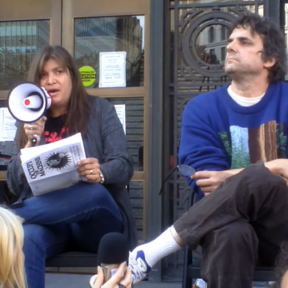
Waziyatawin
: Photo from Wikimedia Commons / Author of Photo: Deep Green ResistanceOverview
* Associate professor of history at Arizona State University from 2000 – 2007
* Currently teaches n the Indigenous Governance Program at the University of Victoria (Canada)
* Characterizes the Republican Party as a racist entity
* Seeks to “eradicate colonial institutions”
* Has worked for the Upper Sioux’s Tribal Historic Preservation Office since 2016
Waziyatawin (formerly Angela Cavender Wilson) is a Dakota Indian who was born on February 13, 1968, in Pezihutazizi Otunwe (Yellow Medicine Village), Minnesota. She earned a BA from the University of Minnesota in 1992, and both an MA and Ph.D. from Cornell University in 1996 and 2000, respectively.
After obtaining her doctorate, Waziyatawin spent seven years as an associate professor of history at Arizona State University. During the presidency of George W. Bush, Waziyatawin taught her students that the Republican Party was a racist entity, and that Colin Powell had “sold out” to the enemies of African Americans by accepting Bush’s appointment as Secretary of State. She also criticized Powell for opposing reparations for slavery. Reasoning from the premise that Republicans were only interested in black people if they could exploit the latter for political advantage, the professor told her class that it was “convenient” for Bush to send Powell, “a black man,” to represent his administration at the United Nations.
Waziyatawin has authored or co-edited five books, including: Remember This!: Dakota Decolonization and the Eli Taylor Narratives; Indigenizing the Academy: Transforming Scholarship and Empowering Communities; For Indigenous Eyes Only: A Decolonization Handbook; In the Footsteps of Our Ancestors: The Dakota Commemorative Marches of the 21st Century; and What Does Justice Look Like? The Struggle for Liberation in Dakota Homeland.
Waziyatawin’s author description at Amazon.com describes her as a “writer, teacher, and activist committed to the pursuit of Indigenous liberation and reclamation of homelands.” Her work, adds the description, “seeks to build a culture of resistance within Indigenous communities, to recover Indigenous ways of being, and to eradicate colonial institutions.”
Waziyatawin currently holds the Indigenous Peoples Research Chair in the Indigenous Governance Program at the University of Victoria (Canada). Since 2016 she has also worked for the Upper Sioux’s Tribal Historic Preservation Office, surveying traditional cultural property and compiling a history of her community. Waziyatawin is also executive director of the Dakota nonprofit Makoce Ikikcupi, a “reparative justice project” supporting Dakota “reclamation of homeland.”
Waziyatawin characterizes herself politically as an “Indigenous Liberationist.” Her interests include projects centering on “Indigenous decolonization strategies such as truth-telling and reparative justice, Indigenous women and resistance, the recovery of Indigenous knowledge, and the development of liberation ideology in Indigenous communities.” “[W]ithin Indigenous worldviews,” she says, “land is life. Colonization, in its fundamental sense, involved disconnecting [Indigenous people] from our homelands (so our homelands could be occupied by settlers instead).”
Further Reading: “Waziyatawin” (Encyclopedia.com, Amazon.com, Living Justice Press).